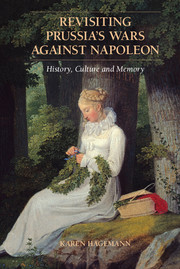Book contents
- Frontmatter
- Epigraph
- Contents
- List of Figures and Maps
- List of Abbreviations
- Acknowledgments
- Revisiting Prussia’s Wars against Napoleon
- Part One A History of Defeat, Crisis and Victory
- Part Two Discourses on the Nation, War and Gender
- 4 Mobilizing Public Opinion
- 5 Defining the Nation
- 6 Debating War
- 7 Regulating Participation
- Conclusion
- Part Three Collective Practices of De/Mobilization and Commemoration
- Part Four Literary Market, History and War Memories
- Part Five Novels, Memory and Politics
- Epilogue Historicizing War and Memory, 2013–1813–1913
- Bibliography
- Name Index
- Subject Index
- Plate section
- References
6 - Debating War
The Military, Warfare and Masculinity
Published online by Cambridge University Press: 05 March 2015
- Frontmatter
- Epigraph
- Contents
- List of Figures and Maps
- List of Abbreviations
- Acknowledgments
- Revisiting Prussia’s Wars against Napoleon
- Part One A History of Defeat, Crisis and Victory
- Part Two Discourses on the Nation, War and Gender
- 4 Mobilizing Public Opinion
- 5 Defining the Nation
- 6 Debating War
- 7 Regulating Participation
- Conclusion
- Part Three Collective Practices of De/Mobilization and Commemoration
- Part Four Literary Market, History and War Memories
- Part Five Novels, Memory and Politics
- Epilogue Historicizing War and Memory, 2013–1813–1913
- Bibliography
- Name Index
- Subject Index
- Plate section
- References
Summary
“Who is a Man?” asked Ernst Moritz Arndt, in a poem that first appeared in February 1813 in the appendix to the Brief Catechism for German Soldiers. This question occupied not only him but also his contemporaries to a degree hardly imaginable today. Diverse images of masculinity were developed in the patriotic-national discourse of the time. Arndt, for example, defined a ”German man“ in the poem as follows:
He is a man prepared to fight,
For his wife and his dear child;
For a cold breast lacks will and might,
And its deeds will be as wind.
He is a man prepared to die,
For liberty, duty, and right:
A God-fearing heart knows all is well,
His step is ever light.
He is a man prepared to die,
For God and fatherland,
Until the grave he’ll carry on
With heart and voice and hand.
So, German man, so, free man,
With God thy lord to the foe!
For God alone can aid thy cause,
And luck and victory bestow.
Here, as in other songs in the Catechism, Arndt entreated German men to recall their core virtues. Apart from military valor, these included love of liberty and country, piety, strength and courage – manly virtues, he asserted, that their Germanic forefathers had demonstrated. At the heart of this model of masculinity was the inseparable equation of masculinity, military valor and patriotism. While these masculine virtues had been propagated, especially in poetry, since the Seven Years’ War, it was only in the war years 1813–15 that they became the core of the dominant model of masculinity that served to bolster recently introduced universal conscription ideologically. A closer analysis of the contemporary discourse, however, reveals complementary and competing variants of this model, each with its own specific political notions of war and military service. In this chapter, I first examine the changing ideas of warfare and the debate over the character of the wars of 1813–15 – which had a lasting influence on the contested construction of war memories and the political claims related to them – and then explore the variant models of valorous masculinity.
- Type
- Chapter
- Information
- Revisiting Prussia's Wars against NapoleonHistory, Culture, and Memory, pp. 130 - 154Publisher: Cambridge University PressPrint publication year: 2015



